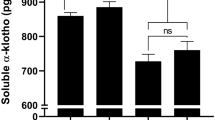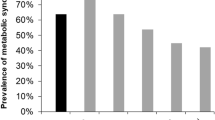Abstract
Purpose
The present study aimed at evaluating the relationship between Klotho levels and insulin resistance and albumin-to-creatinine ratio (ACR) in type 2 diabetic patients with CKD.
Methods
We conducted an observational, cross-sectional study in our outpatient diabetic nephropathy clinic from 2014 to 2016, enrolling a total of 107 type 2 diabetic patients with stage 2–3 CKD, with a mean age of 59 years. Several clinical and laboratorial parameters were evaluated, including those related to mineral and carbohydrate metabolism.
Results
The mean eGFR at baseline was 53.2 mL/min, and the mean levels of ACR and Klotho were 181.9 µg/mg and 331.1 pg/m, respectively. In the simple linear regression model, Klotho levels were correlated with age, phosphorus, PTH, ACR, HOMA, IL-6, FGF-23, OxLDL, eGFR and vitamin D levels. Applying a multivariate linear regression model, only the ACR, HOMA-IR, FGF-23 and vitamin D independently influenced the Klotho levels. In the generalized linear model, only the Klotho groups were statistically significant as independent variable (p = 0.007). The results show that the group 1 (<268) compared with group 3 (>440) had higher odds in the higher ACR (≥181), ORa = 3.429, p = 0.014. There were no statistically significant differences between Klotho groups 2 and 3, and the HOMA-IR obtained showed that group 1 (<268) had greater odds of HOMA-IR ≥2 when compared with group 3 (>440), ORa = 21.59, p = 0.017.
Conclusions
Our results showed that Klotho levels are influenced by FGF23, vitamin D and insulin resistance. This suggests that Klotho levels might be affected by renal function as well as having a relevant role on insulin metabolism and ACR homeostasis.
Similar content being viewed by others
References
Izquierdo MC, Perez-Gomez MV, Sanchez-Niño MD, Sanz AB, Ruiz-Andres O, Poveda J et al (2012) Klotho, phosphate and inflammation/ageing in chronic kidney disease. Nephrol Dial Transplant 27(Supple 4):iv6–iv10
Nakatani T, Sarraj B, Ohnishi M, Densmore MJ, Taguchi T, Goetz R et al (2009) In vivo genetic evidence for Klotho-dependent, fibroblast growth factor 23 (Fgf23)—mediated regulation of systemic phosphate homeostasis. FASEB J 23:433–441
Bernheim J, Benchetrit S (2011) The potential roles of FGF-23 and Klotho in the prognosis of renal and cardiovascular diseases. Nephrol Dial Transplant 0:1–6
Barker SL, Pastor J, Carranza D, Quiñones H, Griffith C, Goetz R et al (2014) The demonstration of αKlotho deficiency in human chronic kidney disease with a novel synthetic antibody. Nephrol Dial Transplant 0:1–11
Koh N, Fujimori T, Nishiguchi S, Tamori A, Shiomi Nakatani T et al (2001) Severely reduced production of klotho in human chronic renal failure kidney. Biochem Biophys Res Commun 280:1015–1020
Hu MC, Kuro-o M, Moe OW (2012) The emerging role of Klotho in clinical nephrology. Nephrol Dial Transplant 27:2650–2657
Hu MC, Kuro-o M, Moe OW (2012) Secreted klotho and chronic kidney disease. Adv Exp Med Biol 728:126–157
Seiler S, Wen M, Roth HJ, Fehrenz M, Flügge F, Herath E et al (2013) Plasma Klotho is not related to kidney function and does not predict adverse outcome in patients with chronic kidney disease. Kidney Int 83:121–128
Kurosu H, Yamamoto M, Clark JD, Pastor JV, Nandi A, Gurnani P et al (2005) Suppression of aging in mice by the hormone Klotho. Science 309:1829–1833
Lin Y, Sun Z (2012) Antiaging gene Klotho Enhances glucose-induced insulin secretion by up-regulating plasma membrane levels of TRPV2 in MIN6 β-cells. Endocrinology 153:3029–3039
Moreno JA, Izquierdo MC, Sanchez-Niño MD, Suárez-Alvarez B, Lopez-Larrea C, Jakubowski A et al (2011) The inflammatory cytokines TWEAK and TNFα reduce renal klotho expression through NFkB. J Am Soc Nephrol 22:1315–1325
Lim SC, Liu JJ, Subramaniam T, Sum CF (2014) Elevated circulating alpha-klotho by angiotensin II receptor blocker losartan is associated with reduction of albuminuria in type 2 diabetic patients. J Renin Angiotensin Aldosterone Syst 15:487–490
American Diabetes A (2010) Diagnosis and classification of diabetes mellitus. Diabetes Care 33:S62–S69
Matthews DR, Hosker JP, Rudenski AS, Naylor BA, Treacher DF, Turner RC (1985) Homeostasis model assessment: insulin resistance and beta-cell function from fasting plasma glucose and insulin concentrations in man. Diabetologia 28:412–419
Levey AS, Stevens LA, Schmid CH, Zhang Y, Castro AF, Feldman HI, Kusek JW, Eggers P, Van Lente F, Greene T, Coresh J (2009) CKD-EPI (chronic kidney disease epidemiology collaboration). A new equation to estimate glomerular filltration rate. Ann Intern Med 150:604–612
Sawires HK, Essam RM, Morgan MF, Mahmoud RA (2015) Serum klotho: relation to fibroblast growth factor-23 and other regulators of phosphate metabolism in children with chronic kidney disease. Nephron 129:293–299
Kacso IM, Bondor CI, Kacso G (2012) Soluble serum Klotho in diabetic nephropathy: relationship to VEGF-A. Clin Biochem 45:1415–1420
Haruna Y, Kashihara N, Satoh M, Tomita N, Namikoshi T, Sasaki T et al (2007) Amelioration of progressive renal injury by genetic manipulation of Klotho gene. Proc Natl Acad Sci USA 104:2331–2336
Lindberg K, Amin R, Moe OW, Hu MC, Erben RG, Östman Wernerson A et al (2014) The kidney is the principal organ mediating klotho effects. J Am Soc Nephrol 25:2169–2175
Kocełak P, Olszanecka-Glinianowicz M, Chudek J (2012) Fibroblast growth factor 23—structure, function and role in kidney diseases. Adv Clin Exp Med 21:391–401
Yilmaz MI, Sonmez A, Saglam M, Yaman H, Kilic S, Demirkaya E et al (2010) FGF-23 and vascular dysfunction in patients with stage 3 and 4 chronic kidney disease. Kidney Int 78:679–685
Silva AP, Fragoso A, Neves PL (2014) Relationship of vitamin d with diabetes mellitus and diabetic nephropathy. Port J Nephrol Hypertens 28:108–118
de Zeew D, Agarwal R, AmdahM Audhya P, Coyne D, Garimella T et al (2010) Selective vitamin D receptor activation with paricalcitol for reduction of albuminuria in patients with type 2 diabetes (VITAL study). A randomised controlled trial. Lancet 376:1543–1551
Author information
Authors and Affiliations
Corresponding author
Ethics declarations
Conflict of interest
The authors declare that they have no conflict of interest.
Ethical approval
All performed procedures were in accordance with the ethical standards of the institutional research committee and with the 1964 Helsinki Declaration and its later amendments or comparable ethical standards.
Informed consent
Informed consent was obtained from all individual participants included in the study.
Rights and permissions
About this article
Cite this article
Silva, A.P., Mendes, F., Pereira, L. et al. Klotho levels: association with insulin resistance and albumin-to-creatinine ratio in type 2 diabetic patients. Int Urol Nephrol 49, 1809–1814 (2017). https://doi.org/10.1007/s11255-017-1646-3
Received:
Accepted:
Published:
Issue Date:
DOI: https://doi.org/10.1007/s11255-017-1646-3




